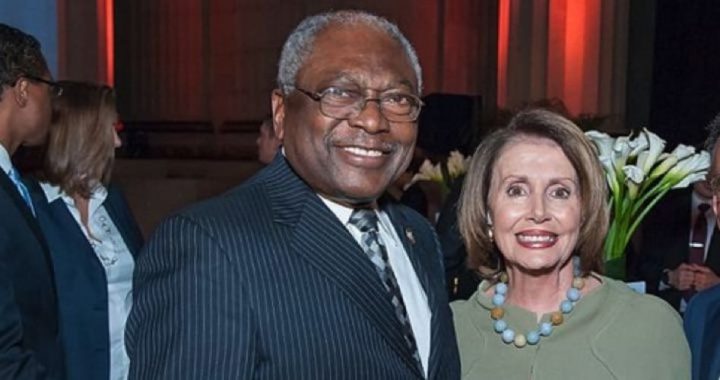
After President Donald Trump described the famous Confederate general, Robert Edward Lee, as a “great general,” several Democrats, no doubt sensing the opportunity to score some political points because of the widespread ignorance of history in general, and of the Civil War and General Lee in particular, rushed to tar Trump as some sort of racist.
Of course, such attacks rest on certain premises, which are mostly wrong — that President Abraham Lincoln sent massive Union armies into the Confederate States to abolish slavery. But Lincoln himself said that his objective was to “save the Union,” and if he could do that without freeing any slaves, he would do it. Of course, Lincoln detested slavery, but the fact remains that the Civil War was not fought to end slavery.
But this is the mistaken belief upon which the House Majority Whip, James Clyburn (shown center), opted to rebuke Trump’s praise of Lee — that the Civil War was fought to end slavery, Lee was the chief Confederate general, therefore Lee was fighting to keep slavery legal.
“The fact of the matter is, Robert E. Lee was a great tactician,” Clyburn admitted, but he “was not a great person.” Clyburn, a congressman from South Carolina, made his remarks on ABC’s This Week.
“Robert E. Lee was a slave owner,” Clyburn said, “and a brutal slave master. Thankfully, he lost that war and I find it kind of interesting the president is now glorifying a loser. He always said he hated losers. Robert E. Lee was a loser.”
When a person testifies in a trial, he or she swears to tell the truth, and the whole truth. A large part of the problem with these discussions about Civil War history is that often we only hear a part of the truth, which is, effectively not telling the truth.
Confederate General Patrick Cleburne died many years before the rise of the Taliban and their efforts to destroy the monuments and symbols of their enemies. But Cleburne did accurately predict the Taliban-like efforts to alter the history of the Civil War. “Surrender means that the history of this heroic struggle will be written by our enemy; that our youth will be trained by Northern school teachers; will learn from Northern school books their version of the war; will be impressed by all the influences of history and education to regard our gallant dead as traitors, and our maimed veterans as fit subjects for derision.”
When Lincoln made his call for 75,000 volunteers to suppress what he termed “the rebellion” in seven southern states, eight more slave states remained in the Union. Four of them — Virginia, North Carolina, Tennessee, and Arkansas — chose to leave the Union and join the original seven Confederate states, not to defend slavery, but as a reaction to Lincoln’s decision to make war on those seven states. Four more states where slavery was still protected by law — Maryland, Kentucky, Missouri, and Delaware — never left the Union at all. One would think if the war was fought to end slavery, as is often said, these states would have also left the Union, and for that matter, Lincoln would have directed Union troops into those states, as well, to end slavery in those states.
But of course, he did not, because the war was fought — not to free slaves, but from Lincoln’s own publicly stated position of saving the Union. And if the war was not fought to end slavery, then Lee could not have been leading the Army of Northern Virginia in order to defend the institution of slavery.
There are several misconceptions about the Civil War, but the most relevant to our discussion of Lee is Clyburn’s charge that Lee was a “brutal slave master.”
The truth is that Lee had denounced slavery long before the war began. Writing to his wife from Camp Brown in Texas in 1856, Lee described his feelings about slavery. “I believe in this enlightened age, there are few who will not acknowledge that slavery as an institution is a moral and political evil.” He added that “our prayers” should aid “the final abolition of slavery.”
Then why did he own slaves? When his father-in-law, George Washington Parke Custis, died in 1857, Lee became executor of the estate, which included slaves. The terms of the Custis will made it practically impossible for Lee to immediately emancipate them. As Douglas Southall Freeman explained in his Pulitzer Prize-winning four-volume biography R. E. Lee, the will contained a provision that only when Custis’ debts were all paid were the slaves to be emancipated.
But Custis had left more than $10,000 in debt and virtually no money with which to operate the estate. The Arlington estate was run-down, and Lee was forced to dig into his own modest financial resources to save the estate. Had he simply sold the estate, the slaves would have been sold, too, and they would have remained in bondage.
It took about five years, but through good management Lee was finally able to free the slaves.
What about the charge that he was a “brutal slaveowner?” Freeman wrote, “There is no evidence, direct or indirect, that Lee ever had them or any other Negroes flogged.”
William Mack Lee, a black personal servant to Lee, remained — voluntarily — with Lee throughout the Civil War and even until Lee died in 1870. He said upon Lee’s death, “I was raised by one of the greatest men in the world.” Lee left Mack $360 in his will, which he used to go to school. He became an ordained Missionary Baptist minister in Washington, D.C., eventually launching 14 churches.
Despite all of this history, Clyburn and others choose to libel the true story of General Lee. (For more information, please see my article, “Robert E. Lee: Answering His Critics,” published in the print version of The New American (September 18, 2017).
Why do they do this? Much of it can be chalked up to ignorance — people hear something and presume it is true. But there are also those who are just malicious. They know the truth, but choose to tell a lie, even about a great man like Robert E. Lee, all for some short-term political gain.
Photo: U.S. government
Steve Byas teaches history at Randall University in Moore, Oklahoma, and is the author of History’s Greatest Libels, in which he defends many famous historical personalities against falsehoods that, much like the untruths told about General Lee, have little to no basis in fact. Among those defended in the book are George Washington, Thomas Jefferson, Marie Antoinette, and Christopher Columbus.



